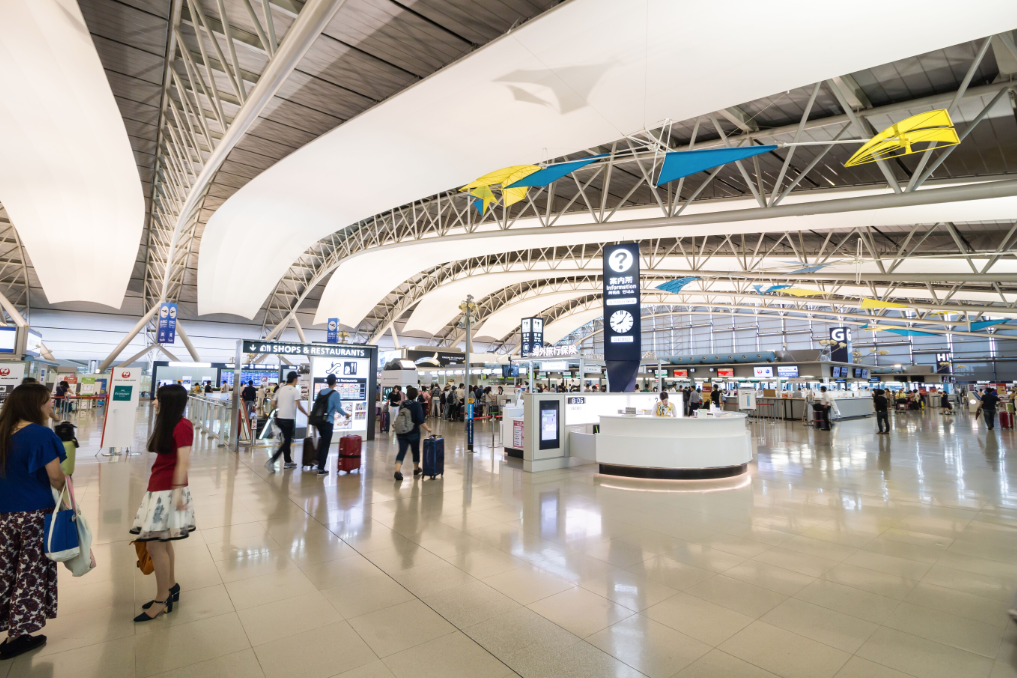Visiting Japan just got more expensive. Slightly. On January 7, a departure tax went into effect that levies a fee of ¥1,000 on anyone leaving the country—whether they are visitors from overseas or Japanese citizens traveling abroad.
While added costs of any kind may seem to be a negative, the travel sector broadly welcomed the move—on the understanding that the money raised will go back into promoting Japan as a unique and fascinating destination.
The fee, officially known as the International Tourist Tax (ITT), is being added to the cost of the tickets of anyone leaving Japan through an airport or seaport. Transit passengers who depart the country within 24 hours of arriving and children under the age of two are exempt.

FUNDING GROWTH
According to the website of the Japan National Tourism Organization (JNTO), the ITT is “a small tax that will make a significant difference.”
Revenue will be invested in creating a more comfortable and “stress-free tourist environment,” the JNTO said. This includes improving access to information about a wide range of tourist attractions around the country and developing tourism resources by “taking advantage of the unique cultural and natural assets of different parts of the country.”
In a statement, the Ministry of Land, Infrastructure, Transport and Tourism added that it aims to make Japan “the top tourist destination.”
The ITT is the first new national tax introduced by Japan in 27 years—a fact the government has been keen to point out.
The government estimates that it will earn about $540 million each year from the tax, a figure that will inevitably increase as tourist numbers continue to rise. The additional funds will help Japan reach its annual target of 40 million inbound tourists by 2020, the year in which Tokyo will host the Olympic and Paralympic Games, and the even more ambitious target of 60 million arrivals by 2030.
In 2018, a total of 31.19 million tourists arrived in Japan, a record high and up 8.7 percent from the previous year.

SECTOR SUPPORT
While the travel industry as a whole has expressed its support for the tax initiative, they are awaiting further details on exactly how the windfall will be reinvested in a sector that has become the third-largest earner for the national economy.
“We have received information that suggests money will be spent on airport facilities as well as two other areas, but with few specifics,” said Alison Espley, managing director of sales for Japan and the Pacific for United Airlines and vice chair of the American Chamber of Commerce in Japan (ACCJ) Transportation Committee.
“The committee’s position is that the funds should be used to benefit those who have paid them—meaning customers of the airport who are financing the tax—and that the funds should be spent on facilities to ensure the continued competitiveness of Japan’s airports compared to others in the Asia–Pacific region,” she told The ACCJ Journal. “This could include transportation to and from the city and connectivity between airports.”
“This will help to ensure that foreign visitors, whether traveling for business or pleasure, receive a strong and positive impression of Japanese efficiency at the beginning and the end of their trip.”
The committee also favors using the money to help fund security measures for aviation, such as the introduction of facial recognition technology, which would lift the requirement for airlines to cover 50 percent of the cost of airport security as dictated by Japanese law. Espley said this model is “not normal,” as in most countries—including the United States—the government covers all security-related costs.
The committee does not, however, support spending the tax money on upgrades to Wi-Fi facilities in urban areas, multilingual information at famous tourist spots, new toilet facilities, or construction of integrated resorts, Espley said.
BROAD BENEFIT
Sanae Sekiya, a senior partner at the Tri-Star Legal Office in Yokohama and co-chair of the ACCJ Tourism Industry Committee, believes the new tax will ultimately benefit the industry.
“I am for the departure tax if it is used not only for encouraging tourism in Japan but also for considering issues like over-tourism in places such as Kyoto, Osaka, Fukuoka, and Hokkaido, all of which are packed with visitors,” she said.
And that problem is only going to intensify as more foreign travelers come to Japan, she said, so measures that, for example, encourage people to get off the well-worn Golden Route that links Tokyo with Kyoto and Osaka are welcome.
Sekiya plays down concerns that the new levy might discourage travelers—even those who are on a budget—from coming to Japan.
“Other countries, such as Australia, Mexico, Hong Kong, and Cambodia, impose a departure tax on tourists, and they still have budget travelers,” she pointed out. “I think a departure tax of less than $10 is acceptable, as long as Japan has something attractive to offer travelers.”
COMMON PRACTICE
Around the globe, more than 30 nations impose similar departure taxes on visitors, ranging from a mere $3.50 to leave Bangladesh to the $95 required to depart from Fiji.
“When we consider the significant growth in tourism for Japan, it is logical to review different methods that can generate funding dedicated to improving the travel and guest experience,” said Steve Dewire, general manager of the Grand Hyatt Tokyo and co-chair of the Tourism Industry Committee.
“Other countries and cities around the world are taking this same approach to enhance the quality of their tourism experience, and I believe that this is the appropriate decision for Japan as well,” he said.
“I think many inbound tourists are familiar with these kinds of taxes, which can take different forms in different countries. I do not believe this will deter tourism. But, we do need to be sure that the experience they have is constantly being enhanced through the timely and targeted use of these funds.
Dewire pointed out that Japan has been exceeding earlier growth targets for tourism at a strong pace. “This trend should continue through the Olympic Games and then adjust for the future, based on the trends that come in the following decade. It is a remarkable time to see how Japan has been positioned on the world stage and all that is to come.”
Back at United Airlines, Espley said that Japan’s tourism authorities have “done an excellent job of promoting inbound travel” and that the numbers—particularly reaching the target of 20 million annual arrivals fully two years ahead of plan—speak for themselves.
“We applaud the Japanese government’s focus on increasing inbound travel and admire the impressive results, but we believe that equal focus should be given to encouraging outbound travel from Japan,” she added. “While recognizing seasonal differences, for airlines to thrive, it is imperative that we have a balanced contribution of business.”
Custom Media publishes The ACCJ Journal for the American Chamber of Commerce in Japan.
© The ACCJ Journal Take our user survey and make your voice heard.
Take our user survey and make your voice heard.















1 Comment
Login to comment
Scrote
If this is true, why does my last flight to the US have a "US security fee" added to the cost? There are 8 taxes and fees in addition to the base fare and fuel surcharge, shared between the Japanese and US sides. The new departure tax isn't listed, even though I left in January.
Spending the "tourist tax" on facial recognition systems seems unlikely to promote tourism in any way. I'm sure lots of bribes will be paid in order to win the over-inflated contracts to provide these systems. The money will be frittered away with no discernable benefit.